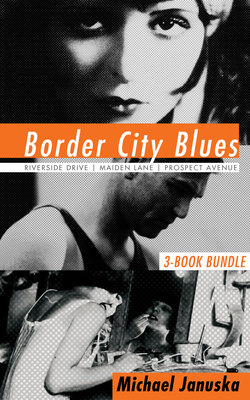Читать книгу Border City Blues 3-Book Bundle - Michael Januska - Страница 26
На сайте Литреса книга снята с продажи.
— Chapter 17 —
ОглавлениеCURTAINS
Henry Fields was recovering in a hospital bed at St. Joseph’s. A bullet had grazed the side of his head in the shootout and nearly taken off his ear. In the bed next to him was a man in much worse shape. Clara thought he looked as if he had fallen down a flight of stairs. She got up to check the cloth on her brother’s forehead. It was as warm as his cheek and the pitcher at his bedside was empty. There had to be a utility room on the floor somewhere.
“Henry,” she whispered in his ear, “I’ll be right back.”
She glanced over at the other bed. The man seemed harmless enough, sawing away like some big ugly baby. She set out in search of an oasis. Clara had done some volunteer work after the war, light duty looking after soldiers like Henry who needed some fine-tuning before they finally got to sleep in their own beds. It had started with one of the nurses asking if while she sat there she could roll some bandages. Next thing she knew she was serving lunch. So today while she was at St. Joe’s, Clara thought she would look in on the veterans’ ward.
It wasn’t what she expected. These weren’t outpatients coming back for follow-up treatment. Three years later these soldiers were still waiting to complete their journey home. There were more than a dozen of them; pale, thin bodies dressed in bandages with red, yellow, and purple stains. Broken and disfigured, they were held together with steel plates, tubes, and wire. In their wheelchairs and prosthetics they looked half man, half machine. Several of the sisters were ministering to their hearts and souls. Clara paused at the door at the other end and gazed back across this white linen wasteland. She could not imagine a worse existence, but there was. Upstairs were the soldiers with the invisible wounds, the shell-shocked and sick of mind that had yet to wake from their nightmare. These boys’ introduction to the modern age came in the form of gas grenades, flamethrowers, armoured tanks, and bombs dropping out of airplanes. Where others worked to keep the memory of the war alive, these men spent every minute of every day trying to forget.
Clara stepped backwards through the swinging door and was almost knocked down by a doctor in a hospital robe and mask.
“Pardon me,” she said.
He didn’t even look at her, just continued on his way, turned a corner, and disappeared.
The utility room was at the end of the hall. She set the pitcher down in the sink and let the water run. When it was full she poured herself a glass, downed it in three long gulps, and then headed back to the ward.
The swinging doors were closed. She pushed one open. It looked as if the other patients had been taken into the garden already. After a restless night under the sheets they usually got wheeled outside, where they could sit in the shade and drag some lemonade through a straw. The curtains were drawn around Henry’s and the other patient’s bed. Clara figured the nurses were trying to give them some peace while they moved the other patients out.
Clara gently pulled the curtain back and found Henry fast asleep. The other patient was stirring. She set the pitcher down on the table and went around to his bed.
There was a pillow over the man’s face. She yanked it off. She’d seen dead before and this guy was it. A shadow caught her eye. She jumped around, pulled the curtain back, and saw the doctor from the hallway holding a pillow over Henry’s face. He grabbed her mouth before she could scream. Soon Henry was awake and struggling. The doctor pushed Clara down on the bed and was trying to pinch her nose with his thumb. Unless she did something quick he’d finish them both off. Her hand fell on the pitcher. She swung at his head and with a thud and a splash he dropped to the floor. Henry pulled the pillow off his face, gasping for air.
Clara cursed McCloskey out loud. She knew he had to have something to do with all of this, and if she never saw him again it would be too soon.
Over at the Border Cities Star, the final edition was being proofed. There was a new headline: WELLINGTON’S DEFEAT. All told, three men died at the shootout at the Elliott — one constable, a motorcycle cop, and some nameless gangland thug. The paper called it “Wellington’s Defeat” because the police had originally gone to the Wellington Hotel at the corner of Elliott and Wellington instead of the Elliott Hotel a few blocks south on Wellington. That mix-up gave most of the gang time to escape or at least prepare for a confrontation with police. No one knew how it happened. There was talk of an investigation.
